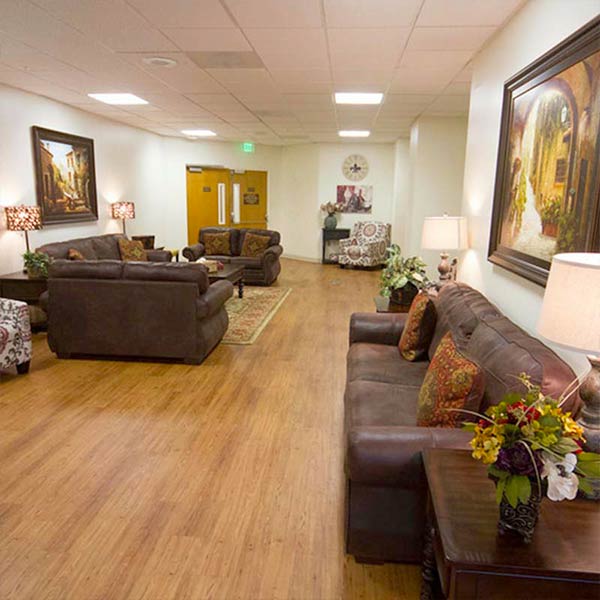Greenleaf Behavioral Health Hospital, located in Valdosta, Georgia, offers a premier intensive outpatient program (IOP) for adolescents ages 12-17 of all genders who are struggling with mental health and addiction concerns.
Our adolescent IOP, or Teen Focus program, is ideal for young people who do not need the intensive services of an inpatient unit but can benefit from more structured treatment than traditional outpatient services provide. Teen Focus IOP patients can attend programming after school and return home in the evenings.
What Is Adolescent Outpatient Programming for Mental Health & Addiction?
In our adolescent IOP at Greenleaf Behavioral Health, we serve young people in the greater Atlanta, Georgia, area who have mental health concerns, such as depression, personality disorders, psychosis, anxiety, and posttraumatic stress disorder. We also provide care for youths who have addictions to substances like alcohol, prescription painkillers, and benzos. Young people who participate in our adolescent IOP can attend programming after school, from 3:30-6:30 p.m., three days per week. We also offer a virtual version of our adolescent IOP that allows young people to participate from home. The typical length of stay in our adolescent IOP is four to six weeks.
Young people can struggle with the same mental health and addiction concerns as adults do. However, adolescents are also undergoing significant physical, emotional, and cognitive changes. Teens face shifts in hormones and new academic and social pressures. Adolescents who are struggling with mental health and addiction concerns, in addition to typical developmental changes, can benefit most from age-appropriate support.
Our Teen Focus program is an intensive outpatient program designed to help young people learn strategies to heal and thrive. Elements of our adolescent IOP include:
- Developmentally appropriate care: Behavioral health professionals who are sensitive to and trained in the specific developmental changes adolescents are experiencing can best provide care for them.
- Evidence-based treatment modalities: Evidence-based treatment modalities have been extensively researched and have proved effective in clinical trials. These treatments are based on scientific evidence and are considered to be the best possible practices in the field of behavioral health.
- Structured scheduling: The benefits of structured scheduling include a sense of stability and accountability. An IOP can help young patients continue treatment while integrating into their communities and fulfilling their school responsibilities. Intensive outpatient programming can also help reduce the chances of relapse for patients who are struggling with addictions.
- Education: Learning new coping strategies is an important part of our adolescent IOP. Our programming emphasizes education and includes regular group sessions that cover topics such as anger management, grief, and empathy.
- Peer networking: Patients in our IOP have the chance to meet peers who may share common experiences. Peer networking can validate and empower adolescents and is an invaluable part of our teen IOP.
- Individualized treatment plans: Treatment that is based on an individual’s unique strengths and needs can best help them achieve long-term healing.
- Aftercare support: Our multidisciplinary team of behavioral health and medical professionals develops an aftercare plan for each patient who participates in our adolescent IOP.
Learn More About Our Adolescent Intensive Outpatient Program
We understand that healing is a process, so we strive to provide programming that can support young people at various steps along the way. For teens who no longer need 24-hour care, our intensive outpatient program can provide a safe place where they can continue to receive therapies and services. Our Teen Focus program is an intensive outpatient program for adolescents that offers structured support three afternoons per week. Young people can enter our Teen Focus IOP directly, or they can step down to the intensive outpatient program from our inpatient unit.
At Greenleaf, we strive to provide individualized care. This begins with the admissions process. Each of our patients completes a thorough intake evaluation that can give us insight into their history, health, and therapeutic needs. Based on this information, our team designs a personalized care plan that can include:
- Medication management services: Patients meet with a psychiatrist once a month. They can receive prescriptions for medications, and our team also monitors the effectiveness of any medications patients are taking. Please note that not all patients will be prescribed medication.
- Individual therapy: In individual therapy sessions, a patient can meet with a therapist one-on-one to discuss their feelings and thoughts. Therapists can offer support and encouragement along with education and insight. Patients in our adolescent IOP have individual therapy sessions with a therapist as needed.
- Group therapy: Group therapy sessions are led by a therapist and allow patients to meet with their peers to share their experiences and offer each other support. Group sessions are held three times a week.
- Cognitive behavioral therapy (CBT): CBT can help patients better understand how thoughts and behaviors relate to each other. Using CBT, therapists strive to help patients develop healthier thought patterns that can assist them in managing distressing emotions.
- Dialectical behavior therapy (DBT): DBT can help patients identify and alter behavioral patterns that negatively impact their thoughts. Therapists use DBT to help patients learn to accept their emotions while also working to regulate them.
- Motivational interviewing: Therapists use motivational interviewing to encourage patients to develop a desire to change negative habits. Using empathy, reflective listening, and open-ended questions, therapists can give patients the opportunity to develop their own ideas of ways they can improve their lifestyles.
- Person-centered care: Person-centered behavioral healthcare is focused on each patient’s unique needs and therapeutic goals. This kind of care includes collaboration, individualized treatment plans, and cultural sensitivity.
- Guided meditation: Guided meditation can promote emotional and mental well-being by reducing stress and helping young people gain self-awareness.
- Art therapy: Art therapy can provide an outlet for emotional expression and a chance to build self-confidence.
Benefits of Adolescent IOP Participation at Our Valdosta Hospital
Adolescents who have mental health concerns and substance use disorders can struggle with academics, isolate themselves, and fail to thrive. At Greenleaf, we provide therapies and services that can help young people alter poor lifestyle choices, gain confidence, and envision a brighter future. We collaborate with each young person in our care to develop a treatment plan that best suits their needs. Some of the most common benefits of taking part in intensive outpatient programming include:
- Personal growth: An adolescent IOP can support and encourage teens to make positive changes and experience personal growth. IOP patients can gain self-awareness, learn to regulate their emotions, and experience the sense of satisfaction that comes with setting and reaching goals.
- Community support: Mental health concerns and substance abuse can lead teens to feel isolated and lonely. The chance to meet with peers who are going through similar developmental phases and working toward common therapeutic goals can be helpful and supportive.
- Skills development: Adolescent IOPs often focus on education as an important part of programming. Teens can develop many skills, including coping strategies, stress management, assertiveness, and effective communication.
- Improved relationships: Young people who participate in an intensive outpatient program can experience improved relationships as a result of skills and understanding gained in therapy sessions. For example, conflict resolution and active listening skills can help young people mend strained relationships and connect better with loved ones.
- Symptom management: Expert therapists can use evidence-based therapies to help patients develop skills to manage mental health concern symptoms.
- Relapse prevention: Adolescent IOPs can help teens who are struggling with addictions recognize triggers and develop coping skills to manage them. Using the relapse prevention skills they gain in intensive outpatient programming can help teens achieve lasting recovery.
- Enhanced self-esteem: Participating in an IOP can help teens improve their self-esteem as they gain a stronger sense of self and develop more positive thought patterns.
- Independence: A common part of adolescence is the desire to gain independence from parents. In an adolescent IOP, education on accountability, self-advocacy, and goal setting can help adolescents direct their desire for independence in a positive direction.
Continued Care After Our Adolescent IOP
We want the young people who receive care in our Teen Focus IOP to continue to thrive after they leave our program. For this reason, we start developing a patient’s aftercare plan at the beginning of their time in our adolescent IOP. Whether patients are from Valdosta, the neighboring community of Atlanta, Georgia, or out of state, our multidisciplinary team of professionals works together to create this plan. Depending on each person’s needs, this plan can include a referral to a lower level of care, information on support groups, and other community resources designed to help our patients continue to progress. The benefits of a structured aftercare plan for the young people who are leaving our IOP include:
- Relapse prevention
- Ongoing, structured support
- Accountability
- Skill reinforcement
- Lifelong healing
We believe that the healing process is best thought of as an ongoing journey, and we strive to provide a foundation for this process and prepare our young patients for lasting success. If you have any questions about how our adolescent IOP can help you or a loved one, please contact us. Our admissions counselors are available 24/7 to answer questions or help you begin the admissions process with a free, confidential assessment.
This content was written on behalf of and reviewed by the clinical staff at Greenleaf Behavioral Health Hospital.








